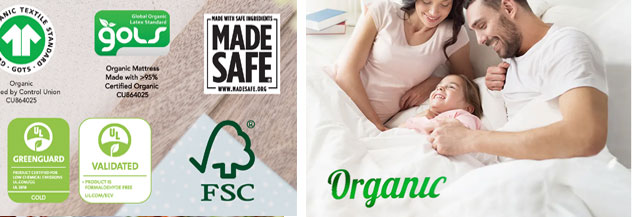Organic Mattress Retailing Series - Part 2: What’s An Organic Mattress?
Furniture World News Desk on
5/10/2023
 Barry A. Cik
Barry A. Cik
In the first installment in this series on Organic Mattress Retailing (www.furninfo.com/series/Naturepedic/66), I noted that the major force driving consumer interest in purchasing organic mattresses is an increased focus on healthy living. We all know that the organic produce sold alongside less healthy options in most grocery stores is produced without adding artificial chemicals, but what are the defining characteristics of organic bedding?
Polyurethane Foam: A major characteristic of most organic mattresses is that they do not contain polyurethane foam. The Global Organic Textile Standard (GOTS), the leading standard for organic mattresses, explicitly states that to qualify for GOTS certification, mattresses and textiles cannot contain polyurethane foams, including all versions of memory foam, soy foams, eco foams and plant-based foams.
Other Materials & Chemicals: Organic mattresses do not contain numerous other materials and chemicals, but this can depend on technical specifics. It’s a long list that includes many latex foams, heavy metals, flame retardants, endocrine disruptors, plasticizers, pesticides, phthalates, formaldehyde and all genetically modified materials (GMOs). Many petroleum-based materials are not used in organic mattresses, although there are no rules published regarding the maximum percentage allowed.
Organic Mattress Construction: Organic mattresses generally incorporate organic fibers, approved latex and other approved, reasonably non-toxic materials. Included are certified organic cotton fabrics, certified organic cotton fill, certified organic wool, steel coils and latex made from rubber sap approved by GOTS for organic mattresses. Other materials may be allowed in minor amounts and/or for accessory uses.
Other Certifications: Although the primary standard for organic mattresses is the Global Organic Textile Standard (GOTS), other recognized relevant organic standards include the Global Organic Latex Standard (GOLS), the Organic Content Standard (OCS) and a new certification called the Regenerative Organic Alliance. The only one currently recognized by the USDA National Organic Program is the GOTS standard.
Buyer Beware: Before we move on to other relevant organic mattress topics in the third installment in this series, it’s important to understand that the word “organic” is, unfortunately, not defined or regulated by the U.S. government for mattresses. That said, the Federal Trade Commission may soon issue guidance on the use of the term “organic” for consumer products like mattresses. Right now, the USDA definition of the term “organic” only applies to agricultural products, for example, organic apples and organic apples that have been processed into organic apple juice. The same is not true for “organic cotton” once it is processed chemically and otherwise into clothing or a mattress. That’s why voluntary certification standards, like GOTS, are critical in determining what can and cannot be considered an organic mattress.
If you are considering adding organic mattresses to your merchandising mix, it’s best to clarify the claims you make to your customers. The only safe way to do that is to purchase organic mattresses that are GOTS certified, or which have other organic mattress and bedding certifications.
About Barry A. Cik: Barry A. Cik is a Board Certified Environmental Engineer and founder and technical director of Naturepedic Organic Mattresses & Bedding. Since 2003, Naturepedic has been on a mission to protect the lives of families through safer, healthier organic-based products that have a positive impact on the environment. A brand with purpose, transparency, and ethical practices, Naturepedic is the recipient of many certifications and is highly respected by numerous health and environmental organizations (https://www.naturepedic.com/certifications) and is an EPA Green Power Partner. Since its inception, Naturepedic has been a consistent and generous advocate and supporter of NGOs and nonprofits advocating for the “Right to Know” about what is in the products that people bring into their homes.
Better Bedding & Mattress Sales Series
Articles in Better Bedding & Mattress Sales Series